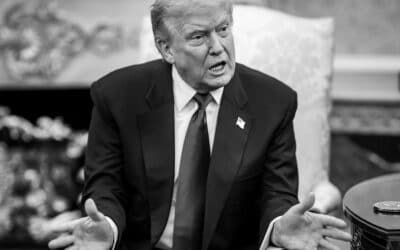In order to establish the state of the economy, economists employ various theories. Yet what are the criteria for how they decide whether the theory employed is helpful in ascertaining the facts of reality?
According to the popular way of thinking, our knowledge of the world of economics is elusive — it is not possible to ascertain how the world of economics really works. Hence, it is held that the criterion for the selection of a theory should be its predictive power.
So long as the theory “works,” it is regarded as a valid framework as far as the assessment of an economy is concerned. Once the theory breaks down, the search for a new theory begins.
For instance, an economist forms the view that consumer outlays on goods and services are determined by disposable income. Once this view is validated by means of statistical methods, it is employed as a tool in assessments of the future direction of consumer spending. If the theory fails to produce accurate forecasts, it is either replaced or modified by adding some other explanatory variables.
Again, in this way of thinking, the tentative nature of theories implies that our knowledge of the world of economics is elusive. Since it is not possible to establish “how things really work,” then it does not really matter what the underlying assumptions of a theory are. In fact, anything goes as long as the theory can yield good predictions. According to Milton Friedman,
The relevant question to ask about the assumptions of a theory is not whether they are descriptively realistic, for they never are, but whether they are sufficiently good approximation for the purpose in hand. And this question can be answered only by seeing whether the theory works, which means whether it yields sufficiently accurate predictions.1
The popular view that sets predictive capability as the criterion for accepting a theory is questionable.
We can say confidently that, all other things being equal, an increase in the demand for bread will raise its price. This conclusion is true, and not tentative. Will the price of bread go up tomorrow, or sometime in the future? This cannot be established by the theory of supply and demand. Should we then dismiss this theory as useless because it cannot predict the future price of bread? According to Mises,
Economics can predict the effects to be expected from resorting to definite measures of economic policies. It can answer the question whether a definite policy is able to attain the ends aimed at and, if the answer is in the negative, what its real effects will be. But, of course, this prediction can be only “qualitative.”2
Do We Know Something about Ourselves?
Economic theory should be able to explain economic activity. However, statistical methods are of no help in this regard. All that the various statistical methods can do is compare the movements of various historical pieces of information. These methods cannot identify the driving forces of economic activity. Contrary to popular thinking, economics is not about gross domestic product (GDP), the consumer price index (CPI), or other economic indicators as such, but about human beings who interact with each other. It is about activities that seek to promote people’s lives and well-being.
One can observe that people are engaged in a variety of activities. For instance, one can observe that people are performing manual work, that they drive cars, and that they walk on the street and dine in restaurants. The distinguishing characteristic of these activities is that they are all purposeful.
Thus, manual work may be a means for some people to earn money, which in turn enables them to achieve various goals such as buying food or clothing. Dining in a restaurant could be a means to establishing business relationships. Driving a car could be a means for reaching a particular destination. People operate within a framework of means and ends — they are using various means to secure ends.
Purposeful action implies that people assess or evaluate various means at their disposal against their ends. At any point in time, people have an abundance of ends that they would like to achieve. What limits the attainment of various ends is the scarcity of means. Hence, once more means become available, a greater number of ends, or goals, can be accommodated — i.e., people’s living standards will increase.
Another limitation on reaching various goals is the availability of suitable means. Thus, to quell my thirst in the desert, I require water. Diamonds in my possession will be of no help in this regard.
The fact that people consciously pursue purposeful actions provides us with definite knowledge, which is always valid as far as human beings are concerned. This knowledge creates the base for a coherent framework that permits a meaningful assessment of the state of an economy.
For instance, during an economic slump, a general fall in the demand for goods and services is observed. Are we then to conclude that the fall in the demand is the cause of an economic recession?
We know that people persistently strive to improve their lives and well-being, hence their demand for goods and services is likely to be rising and not declining. Consequently, the decline in general demand is a result of people’s inability to support their demand. Problems on the production side are the likely causes of an observed general fall in demand. Once we have established that the likely causes of the economic slump are associated with supply factors, we can proceed to assess the possible reasons behind this.
The knowledge that people are acting purposefully also permits us to evaluate the popular theory that the “motor” of an economy is consumer spending — i.e., demand creates supply. We know, however, that without means, no goals can be met. However, means do not emerge out of “the blue” — they must be produced first. Hence, contrary to the popular thinking, the driving force is supply, not demand.
Or, for example, to counter an emerging economic slump, various experts urge the central bank to increase the pace of monetary pumping. By means of an increase in the money supply growth rate it is held that individuals’ well-being is going to be protected. Money, however, does not promote real wealth generation as it can only fulfill the role of the medium of the exchange. On the contrary, an increase in the supply of money will undermine the wealth generation process and will set in motion the menace of the boom-bust cycle.
The fact that man pursues purposeful actions implies that causes in the world of economics emanate from human beings and not from outside factors. Thus, contrary to popular thinking, individual outlays of goods are not caused by real income as such. In his own unique context, every individual decides how much of a given income will be used for consumption and how much for investment. While it is true that people will respond to changes in their incomes, the response is not automatic. Every individual assesses the increase in income against the particular set of goals he wants to achieve. He might decide that it is more beneficial to raise his investment in financial assets than to raise his consumption.
One example that Mises liked to use in his class to demonstrate the difference between two fundamental ways of approaching human behavior was to look at Grand Central Station behavior during rush hour. The “objective” or “truly scientific” behaviorist, he pointed out, would observe the empirical events, e.g., people rushing back and forth aimlessly at certain predictable times of day. And that is all he would know. But the true student of human action would start from the fact that all human behavior is purposive, and he would see that the purpose is to get from home to the train, to work in the morning, the opposite at night, etc. It is obvious which of them would discover and know more about human behavior, and therefore which one would be the genuine “scientist”3
Reprinted from the Mises Institute.































